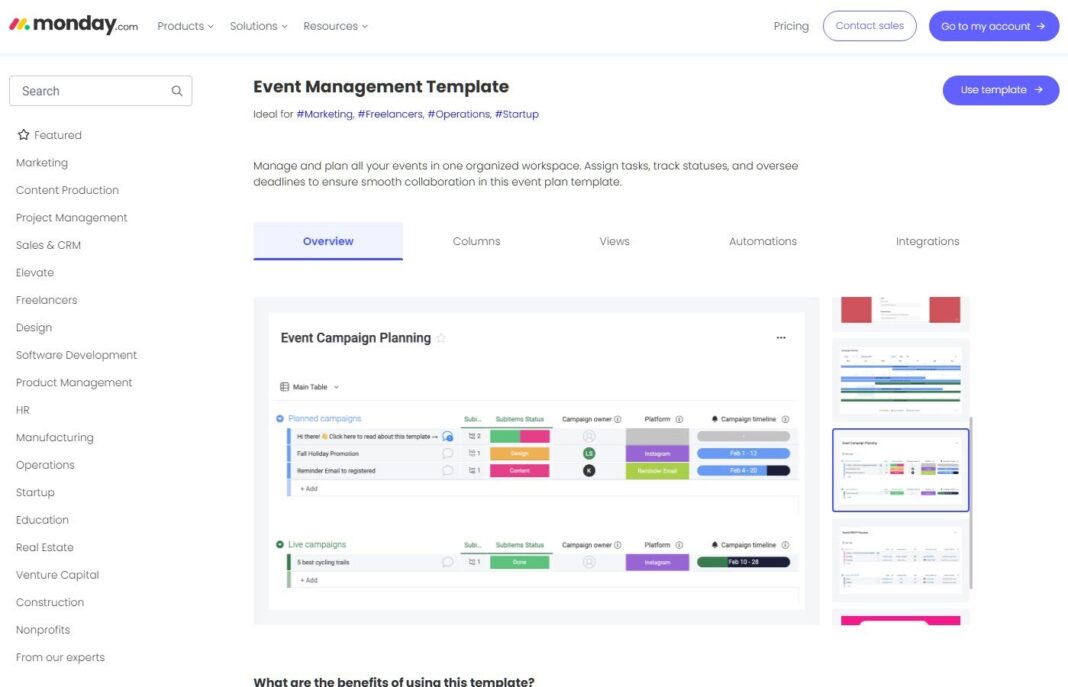Whether you’re a professional event planner, putting together an important conference for work, or just throwing a big party, event planning templates can help you stay organized. From tracking costs to vendor contact information and guest RSVPs, the right system can ensure everything goes according to plan while saving your sanity along the way.
monday.com: An event planning dashboard for managing multiple events, projects, and employees
Planning an event is a lot like managing a project, especially if you’re juggling multiple events alongside other projects and a team at the same time. Since monday.com is one of the best project management solutions on the market today, it’s perfect for managing all three within the same platform.
It comes with everything you need (and then some) to stay organized, plus there’s a free plan for up to two users if you want to try it before upgrading to a paid plan.
More on monday.com: monday.com Review | monday.com vs Wrike | monday.com vs. Pipedrive.
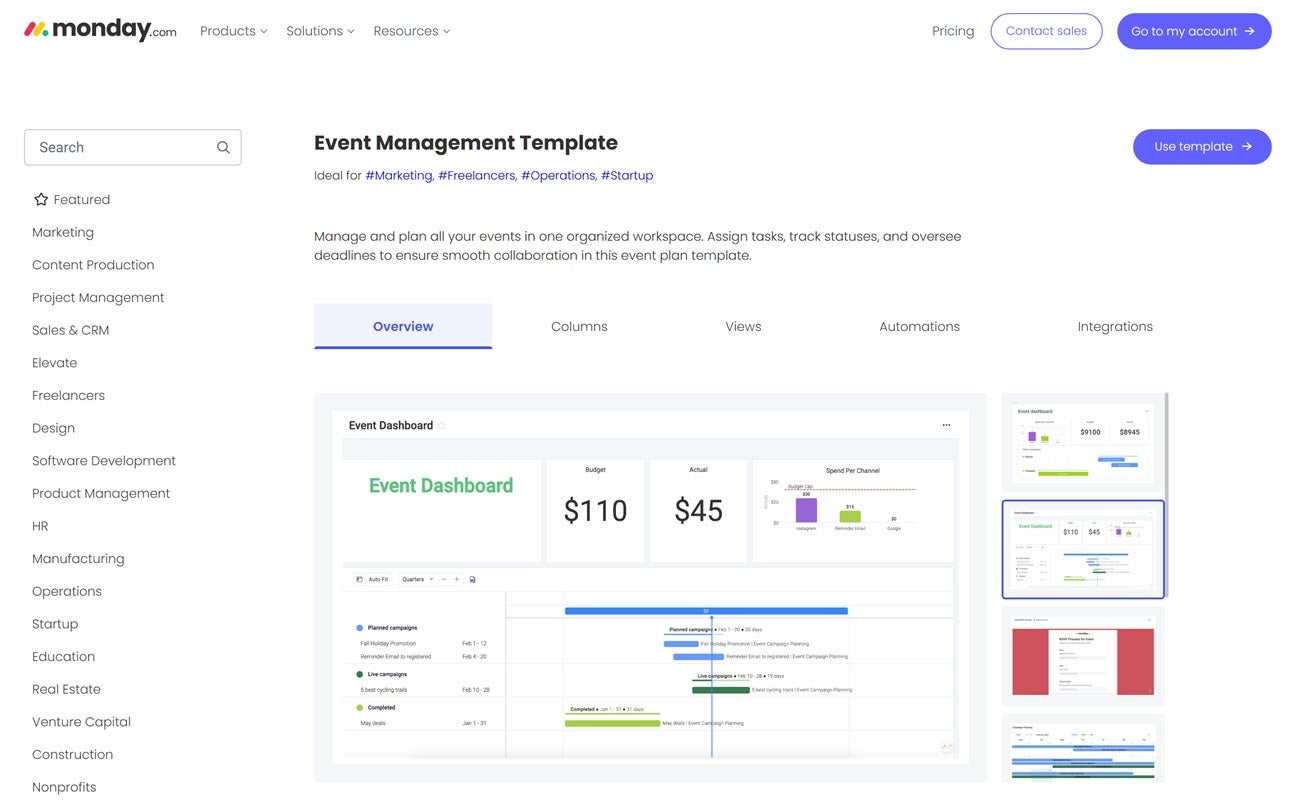
Aside from being able to handle just about any type of project or item you need to keep track of, my favorite part of this event planning template is the built-in budget tracking features.
It allows you to set a budget for an entire quarter or year and allocate that money across all of your events. Alternatively, you can set a unique budget for each event, and track spending by category.
Regardless of how you approach this, you can keep an eye on your numbers and ensure you stay within your budget constraints.
I also like that monday.com helps you streamline the RSVP process. You can easily send out an RSVP form to automatically track attendees without having to deal with manual inputs that are time-consuming and prone to human error.
Each RSVP will show up in your system with all the details the user provided.
ClickUp: Event planning templates for collaborative teams
ClickUp’s project management system is built for collaboration out of the box, including team chat, document building, nested comment threads, and more. This makes it a great option for teams planning events together. ClickUp also makes it easy to track progress and understand everyone’s responsibilities.
You can get started with ClickUp for free and work with an unlimited number of users at no cost. However, most teams will get the most out of it by upgrading to a paid plan.
More on ClickUp: ClickUp Review | ClickUp vs Asana | ClickUp vs Notion.
Template 1: Best for delegating responsibilities and tracking priorities
This first ClickUp event planning template works well for small-to-mid-sized events. I think it safely supports events with up to 250 participants, and it works equally well for smaller events with 50 to 100-person guest lists.
Your entire team can use this to align event resources, visualize what needs to happen, and ensure everything gets done on time and under budget.
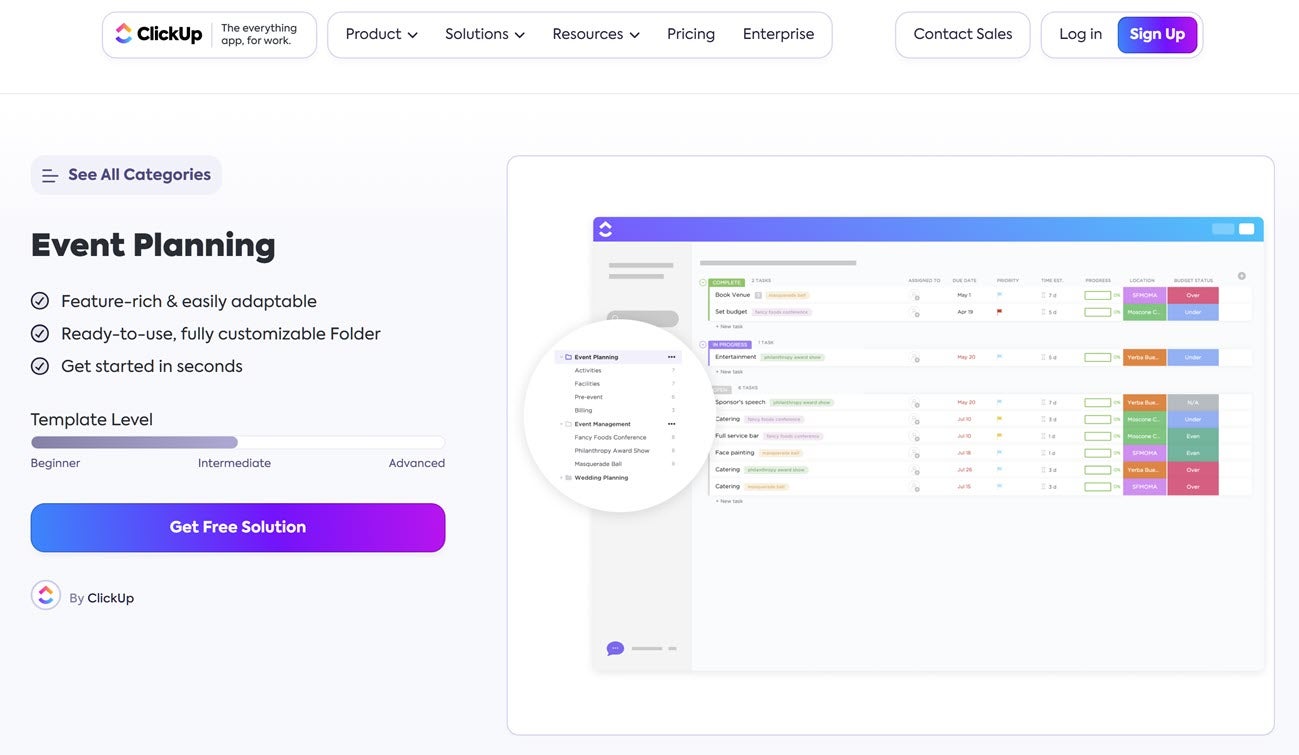
The default template comes with six views, including lists, calendars, and more. My favorite part is that you can set priority levels once and use color coded flags to visually understand priority in any view at a glance.
On top of that, there’s a separate prioritization board that groups everything by priority.
You can easily drag and drop tasks to different sections to ensure your team’s always working on what’s most important.
ClickUp’s built in commenting and mentions feature lets you alert the assignee of priority changes so everyone’s always in the loop. Users can look at all of their assigned work, sort it by priority, and work down their list.
This alone can help you avoid repetitive meetings since everything’s easily visible.
I also like that project or event managers can look at each person’s workload and rebalance everything as needed by dragging tasks to someone else.
Template 2: Best for large corporate events and conferences
If you need to plan and host larger events, like conferences or corporate offsites, you’ll need something with a bit more power. This second ClickUp template offers just that — it’s more advanced than the first and takes a bit more time to set up, but it’s worth it for complex vents that have a lot of moving parts.
It works particularly well if you have sponsors, exhibitors, guests, and a lot of different elements you need to stay on top of.
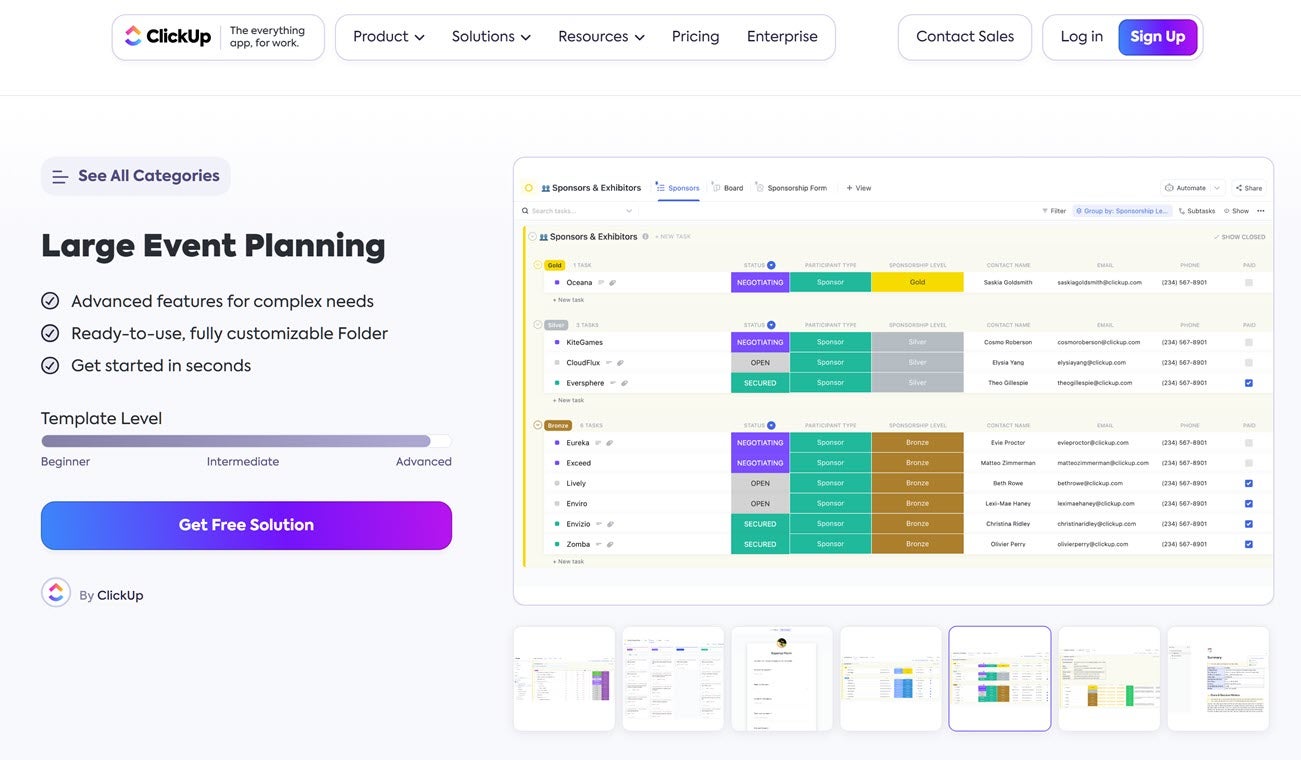
The best part is that it comes with a pre-built expense intake form, allowing your team to track their expenses towards your budget. Each expense can be categorized, so it works just as well for reimbursements too.
You could even set up a separate form for sponsors, guests, or vendors if you need to gather additional information from them.
The sponsor area lets you group them by tier (if you’d like). For example, you could have different statuses based on donation amounts. You can also keep track of payments and donations, their attendance at your event, and even various activities to fulfill sponsor promises.
For RSVPs, there’s a robust registration tracker set up for managing different types of tickets. You can simplify if you don’t need all that, but it’s nice to have it already built out.
Another standout feature of this template is that it can help you gather feedback after the event is over.
Wrike: An event planning template for ongoing internal events
Wrike is a highly structured project management tool that accommodates teams of all sizes. Unlike other project management platforms that restrict the number of users on the free tier, Wrike’s free plan lets you onboard as many users as you’d like.
It also has a range of built in views that can help manage recurring events plus all the work required to make them happen.
More on Wrike: Wrike Review | Wrike vs Smartsheet | Wrike vs Asana.
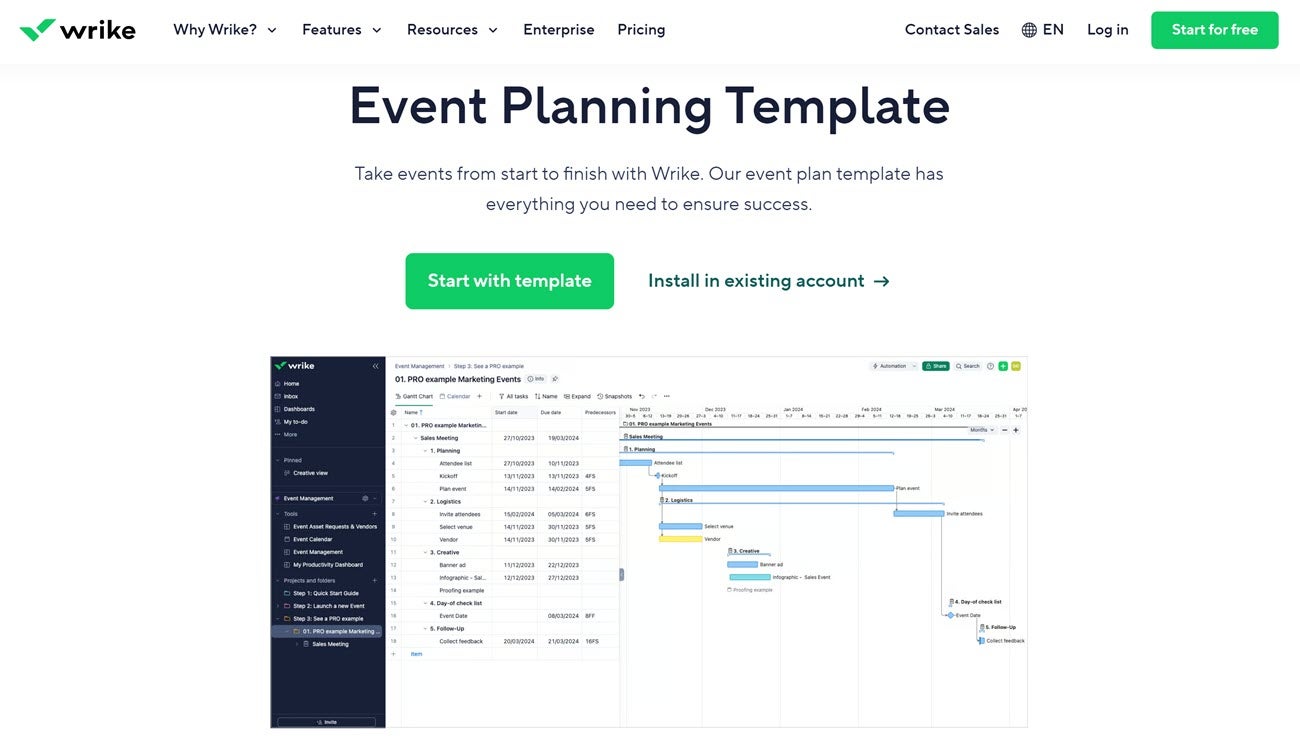
Whether you’re managing regular conferences, product launches, or informal parties, this template makes it easy to visualize everything and stay on top of every task required to set up each event.
Each event can have its own owner, due date, priority, and tasks. Drilling down one level further, each task can also have its own assignee, status, and more.
You can plan events across your entire company in one place or break them up into multiple projects or workspaces.
Each workspace can be rolled up to a higher level view, making it great for managers that need to see all the work in one place. Plus, you can use the template’s built in scheduling system and request forms to track attendance.
My favorite element is that you can map everyone on a Gantt chart with dependencies. However, you have to be on a paid plan to use Gantt charts in Wrike.
Teamwork: An event planner for marketers
Teamwork is a robust project management system for client-based businesses. It can also work well for other types of models, but it’s purpose built for agencies and freelancers.
It has all the typical project and task management features you expect plus things like retainer management, resource scheduling, built in invoicing, time tracking, customizable client views, and proofing workflows.
There’s a free plan for up to five people if you want to try it out, but most businesses will need to upgrade to a paid plan.
More on Teamwork: Teamwork Review | Teamwork vs monday.com | Teamwork Alternatives.
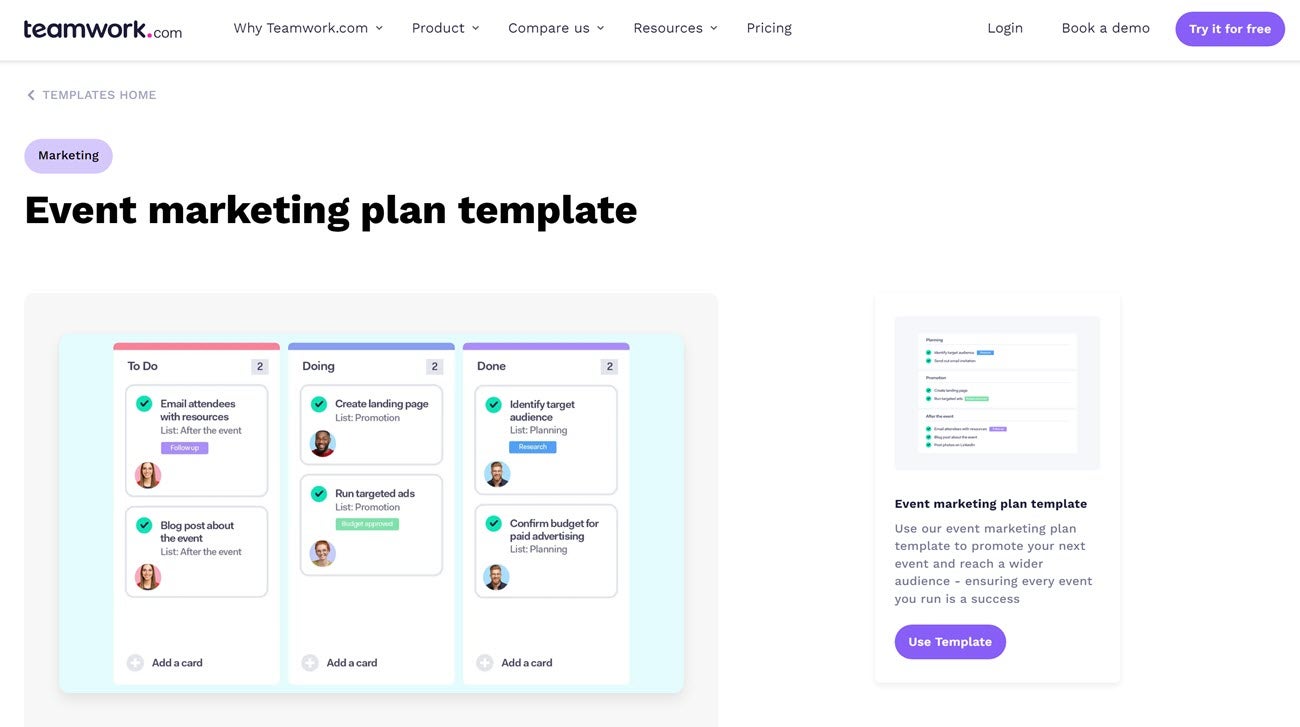
My favorite event planning template for Teamwork is specifically for marketers who need to organize and promote events. You’ll be able to plan ahead, keep track of all the work involved, and manage all the moving parts in one place.
Whether you need to build an email campaign, event landing page, finalize your vendor list, this template has everything you need to stay organized and reach more of the right people.
Another standout feature is the ability to create reusable workflows you can copy to a new project in a few clicks.
Once you’ve figured out the best way to promote your events, you can easily replicate it without having to add all the tasks and assignees from scratch. It can be a huge time saver, especially if you use it to plan recurring events or a lot of short events back to back.
If you like Teamwork but you’re not a marketer, this template can easily be adapted to other departments as well.
Check out our curated list of the best free marketing plan templates if you’re looking for something broader that will help you develop a general marketing plan.
Notion: A personal party planning template
Notion is an online productivity platform that brings tables, spreadsheets, documents, and collaborative elements together. It starts as a blank slate and lets you create a personalized workspace that matches your needs.
If you’re using it by yourself, you can use the free plan without having to upgrade for a long time, making it perfect for planning personal parties.
More on Notion: Notion Review | Notion vs Asana | Notion vs OneNote.
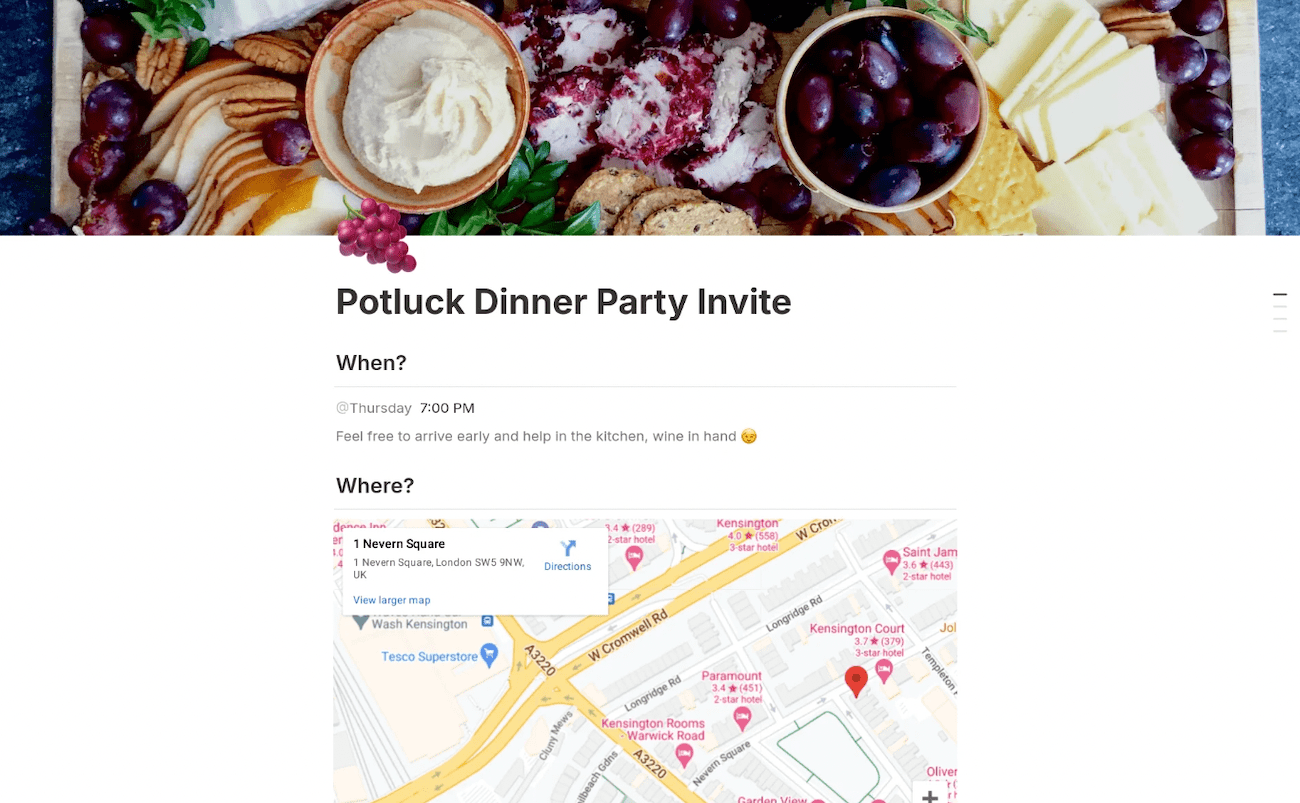
Solo planners don’t need all the bells and whistles that come with all the project management tools we’ve covered so far. This template, on the other hand, is simple and designed for personal use.
It’s great if you’re planning something and don’t want any of the details to slip through the cracks.
You’ll be able to add all your action items, keep track of who’s bringing what, and even assign tasks to other people. But the best part is that you can publish your workspace for free — this makes it visible to anyone who has the link, so you can use it as a digital invitation.
Attendees will be able to RSVP, mention any extra guests, sign up to bring items, let you know about food allergies, or any other details you might need from them.
Overall, it’s a simple way to make sure your next party goes off without a hitch.
Free event planning templates for Excel
If you’re an individual or a small team planning a one-off event, you probably don’t need project management software. A spreadsheet will be more than enough, especially if you have a template to help you get started.
Whether you’re planning a baby shower, family reunion, or a holiday party at work, Excel or Google Sheets plus a group chat or email thread is often all you need.
Template 1: A detailed event planning checklist for Excel
TeamGantt is great for building Gantt charts, but it also offers a ton of free templates for Excel and Google Sheets. One of the best event planning templates is a pre-made checklist covering dozens of different elements you may need to keep track of.
It’s easy to add your own tasks or edit the existing tasks to match your needs.
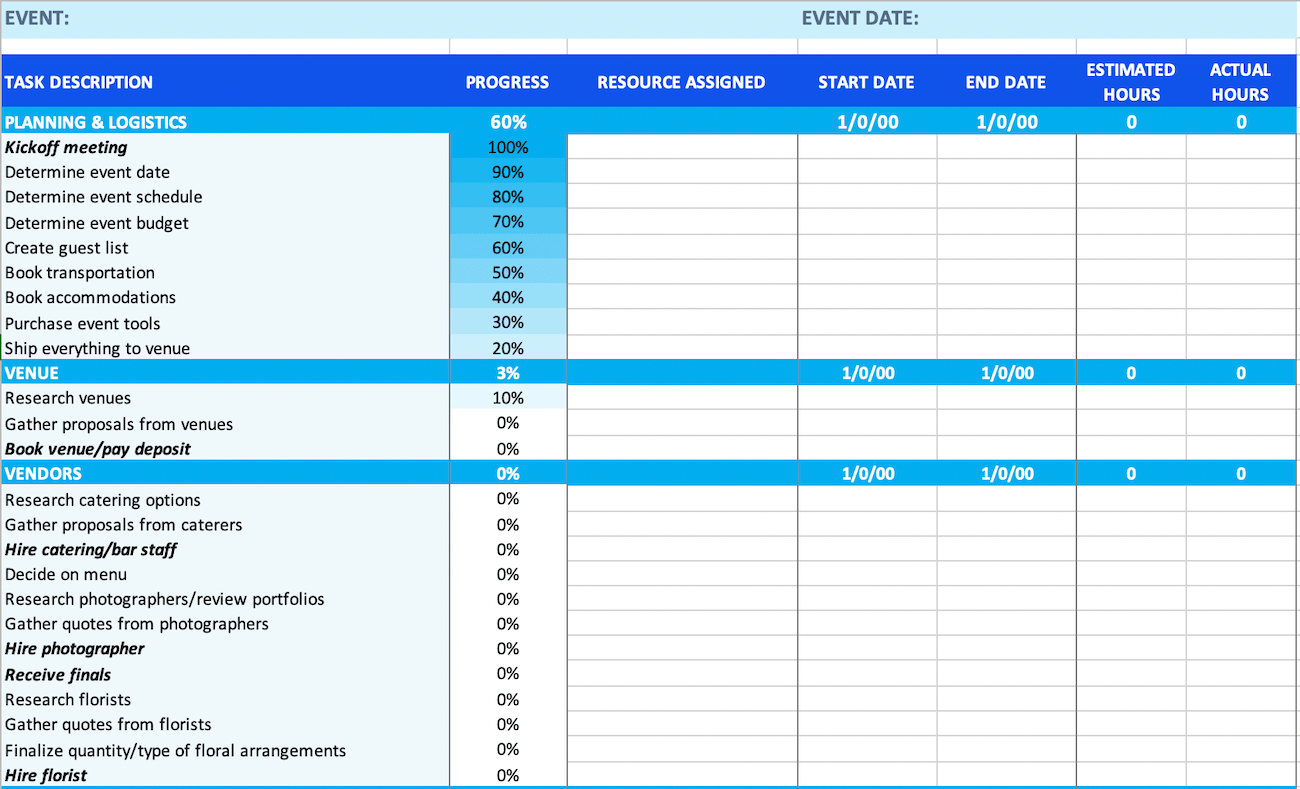
Rather than using a standard status drop down, you’ll be able to set percentages that reflect each task’s progress. It then calculates the overall percentage for each category.
Each task can have its own start and end date, assignee, estimated hours, and actual hours so you can compare.
Although this template is simple, a straightforward checklist is often all you need.
It’s also available for use in TeamGantt if you want more robust visualization and tracking capabilities. With a paid plan, you’ll be able to build out Gantt charts, set up notifications, and collaborate with a team using a similar setup.
Template 2: A simple event calendar for small businesses
Knack is a no-code application builder that also offers free small business templates for Excel and Google Sheets. One of their best templates is a simple event planner that’s perfect for sharing a company wide calendar.
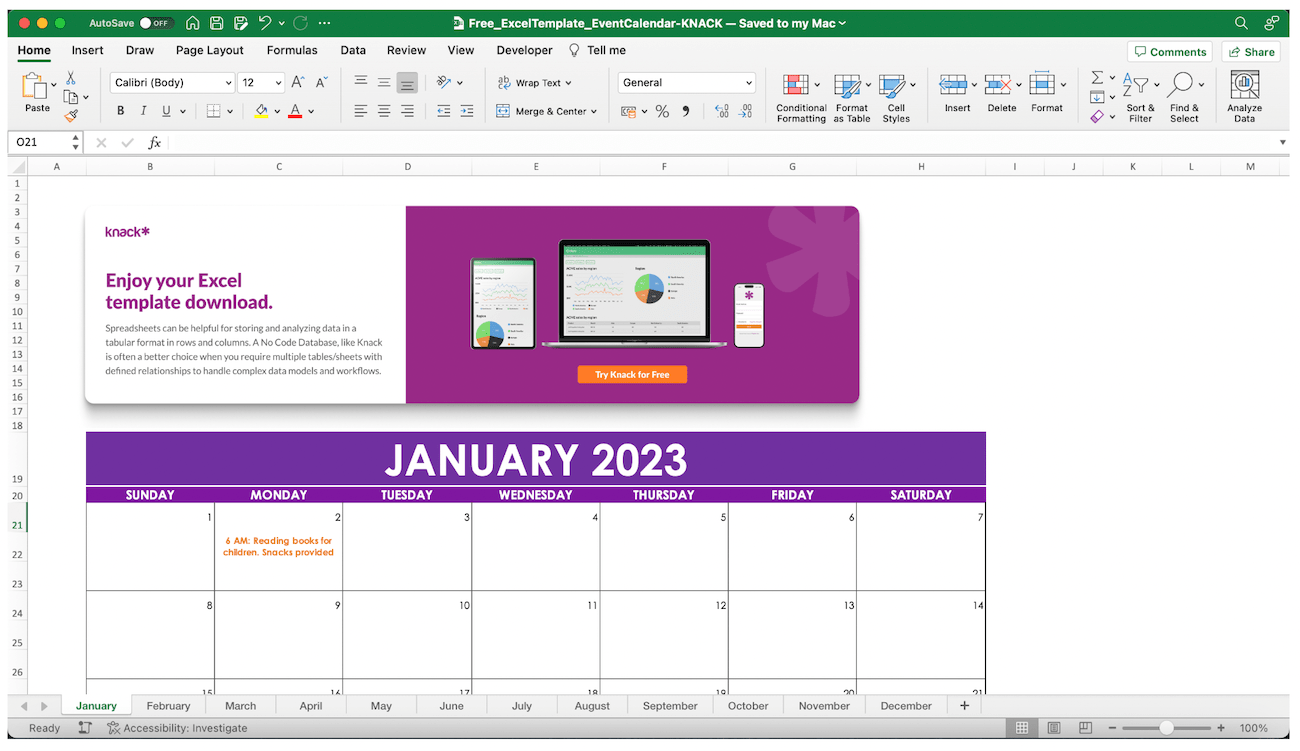
Rather than planning all the work that needs to happen before, during, and after an event, this template is a simple calendar that lets you and your team add events as needed.
It can work well for individuals or small teams who need an easy way to keep track of upcoming events. Whether you’re organizing book signings and author readings, art classes for kids, live shows, or special discounts, it’s incredibly easy to use.
There’s a separate tab for each month and you can create additional copies to continue using it year after year.
Any time someone needs to book an event, they can check the calendar to see when there’s an open date. They’ll also be able to add theirs so nobody else takes it.
When to use an event planning template
If you’re planning an event and you need something more organized than a simple to-do list in your phone, an event planning template can help ensure everything is done on time.
Here are a few scenarios where a template can definitely help:
- An event with more than 50 guests.
- Recurring events or multiple events at the same time.
- Complex logistics (like vendors, exhibitors, and sponsors).
- Attendees will RSVP and potentially add extra guests.
- Your event is longer than a few hours.
- Collaboration with others is required.
- You need to track expenses.
Not sure if you should use one? Create a list of everything you need to get done. If you still feel overwhelmed, a template can help you get even more organized until you feel confident everything is accounted for.
Templates, project management tools, and productivity platforms also offer other benefits, like automations, notifications, and analytics.
You won’t get these from a spreadsheet or note on your phone. If you need or want any of those things, upgrading to something more powerful and using one of the templates in this guide will give you access to more features.
How to choose the right event planning template
Just like events come in all flavors, templates for planning them do too. Some let you plan all the work involved, others are a simple calendar to let others know when events are taking place, and most are somewhere in between.
In most cases, you can use any of the templates here. It really won’t matter which one you use because you’ll be able to customize it to match your needs.
However, it’s a good idea to start with a template that’s close if you don’t want to do a lot of tweaking to make it work.
The following considerations can help you narrow it down:
- Solo vs collaborative events — Some templates are clearly meant for individuals, while others offer more functionality for working with a team.
- One-off vs ongoing needs — Planning one event is a lot easier than planning recurring events or multiple events at the same time. As such, templates for one-off events tend to be simple and straightforward while others are more complex.
- Number of guests — Events with 25 guests, 250 guests, and 2,500 guests require very different levels of planning and coordination.
- Budget planning — Do you need or want to track expenses against your budget? Not every event planning template offers this feature out of the box.
- Timeline — You can use something simple, like a spreadsheet if you’re planning an event that’s in the next couple of weeks, whereas you’ll need something more advanced for planning an event that’s 3-6+ months away. The same is true for planning an event that lasts a few hours vs planning one that spans multiple days or weeks.
- Task tracking sophistication — Do you want to manage task dependencies, priorities, due dates, notifications, and assignees? If so, choosing a template that works in a project management tool you like is your best bet.

